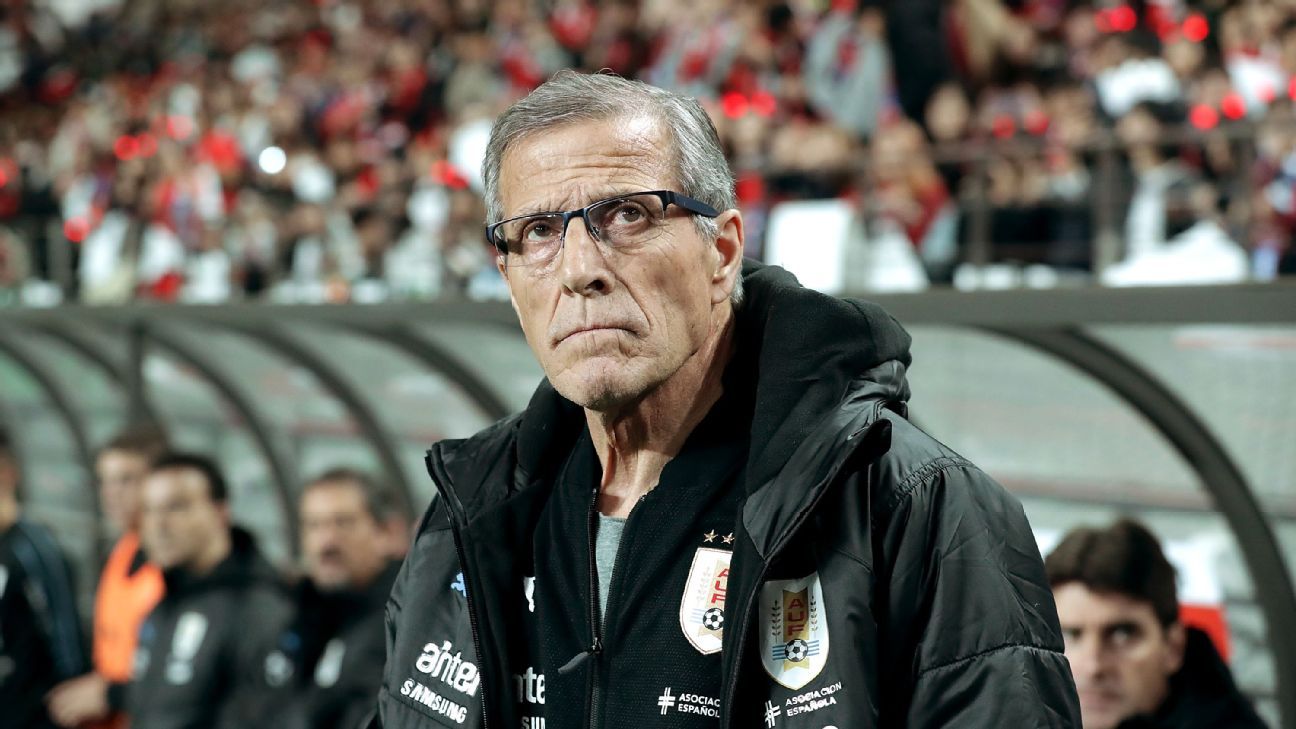
In the 20-20 of hindsight, it would have been better had Oscar Washington Tabarez stepped down as coach of Uruguay after the last World Cup. Instead, he soldiered on, and at the age of 74 his epic, near-16-year reign has come to an end at a time not of his choosing, shown the door after four consecutive defeats, three of them heavy, in the 2022 qualifiers.
Had he gone three years ago then hardly a bad word could have been said against him. He started his second spell in charge of the national team in 2006, taking control of a side that had missed out on three of the previous four World Cups and failed to make it out of the group phase in the other. Uruguay’s glory days, it was agreed, were well and truly in the past. How could it be otherwise with a population little more than 3 million? The first kings of the global game were doomed to eternal status of also-rans.
And yet, in the three subsequent World Cups, Uruguay have always qualified, always made the second round and in two of them were statistically the best side from South America. Last time out they eliminated Portugal, the reigning European champions, in the quarterfinals.
Even so, Tabarez was left with what ifs.
In 2010, for example, what if Luis Suarez had not been sent off in the quarterfinal against Ghana? True, he was guilty of the most blatant handball, but the free kick to Ghana that began the incident was an absurd award in the dying seconds.
– ESPN+ viewers’ guide: LaLiga, Bundesliga, MLS, FA Cup, more
– Stream ESPN FC Daily on ESPN+ (U.S. only)
– Don’t have ESPN? Get instant access
Then in 2014, what if Suarez had not picked up a suspension for his bizarre decision to bite Giorgio Chiellini? After opening-day defeat to Costa Rica, Uruguay had saved themselves with wins over England and Italy — their first World Cup triumphs over European opposition since 1970 — only to lose all momentum when they lost their star striker.
2 Related
Tabarez has done his bit to enlarge the talent pool. Probably the most impressive part of his long reign has been the attention paid to the youth ranks, identifying youngsters with the speed of thought, movement and technique to thrive in the global game, building a relationship with the national team and using the under-20 side as a conveyor belt to the senior side.
And this is what seduced Tabarez into staying on after Russia 2018. He reasoned that in Qatar he would still be able to count on Suarez and Cavani, plus some of his old dependables. And his talented youngsters — especially the likes of Federico Valverde and Rodrigo Bentancur — would have arrived at full maturity. It was too enticing to say no.
So why has it not worked? In part, this has to do with the fixture list. The last four games — lost by a collective score of 11-1 — have been away to Argentina, away to Brazil, at home to Argentina (an unlucky defeat) and the dreaded trip to extreme altitude to take on Bolivia.
This was a cruel quartet. It is worth remembering that before these matches, Uruguay had gone six games unbeaten. September’s three rounds brought seven points — no one did better. And the first game in October, at home to Colombia, began with one of the best half hours that anyone has played in the campaign. Uruguay could easily have been three or four goals up, but the ball refused to go in — and when it did, VAR took it back out. Colombia settled and the game finished goalless. That night flickered at the promise that had so enthused Tabarez, but it was just a flicker — and there have not been enough of them since Russia 2018.
Uruguay’s competitive record since the last World Cup reads as follows: eight wins, eight draws, seven defeats, 25 goals scored, 25 conceded. The first of those games was a 4-0 walloping of Ecuador in the 2019 Copa America. It has been largely downhill from there, with first a surprising shortage of goals, and then an alarming tendency to concede them.
Tabarez has been unlucky with injuries, and has probably shown too much loyalty to keeper Fernando Muslera and centre-back Diego Godin. But the balance of his side proved elusive. The old 4-4-2 with Suarez and Cavani did not seem to suit the midfielders, and efforts to tweak it were not always successful. The back three away to Argentina was especially disastrous.
And now it will be someone else’s problem to solve. Tabarez nearly fell after October’s games. Former international striker Diego Aguirre was lined up. Currently in charge of Brazilian club Internacional, Aguirre was one of the first Uruguay U20 coaches in the Tabarez era, and so would represent a certain continuity.
But now there is more time to make a choice, and consensus in Uruguayan football is always hard to achieve.
Soundings have apparently been made to Marcelo Gallardo, who is coming to the end of his contract with River Plate in Argentina, where he could have the league title wrapped up on Thursday. Gallardo started his coaching career with Nacional of Uruguay, and could conceivably be interested. Outside options include Alexander Medina, doing a fine job in Argentina with Talleres, and Guillermo Almada, boss of Santos Laguna in Mexico.
But Aguirre is the frontrunner, and with the last four rounds featuring games against Paraguay, Venezuela, Peru and Chile, it would be an offer he could hardly refuse. Just a point behind fourth place, Uruguay still look likely to make it to Qatar — where the Tabarez dream of the veterans firing together with the young lions may still come true.

